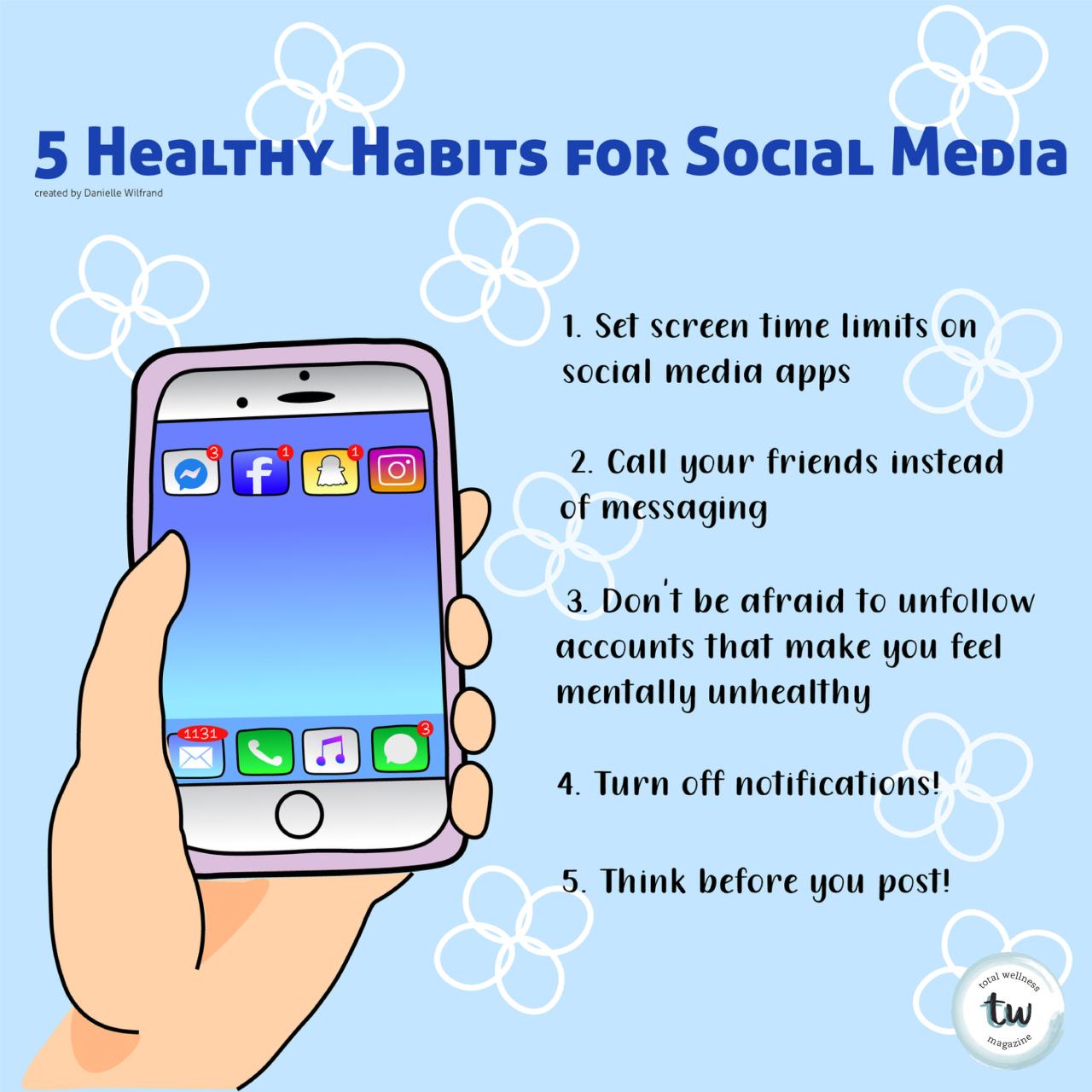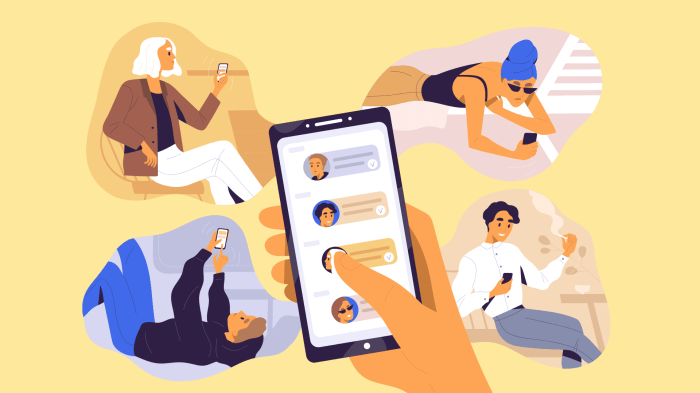Social media habits are more than just scrolling and liking – they shape our daily lives and behaviors in ways we may not even realize. From the positive to the negative effects, this topic delves into the psychology behind our online actions.
Exploring the different types of social media habits and how they influence our mental health, this discussion sheds light on the factors that drive our online behavior.
Introduction to Social Media Habits

Social media habits refer to the patterns of behavior that people develop when using social media platforms on a regular basis. These habits have become significant in today’s digital age as they greatly influence how individuals interact, consume information, and present themselves online.
These habits impact daily life and behavior by shaping how individuals communicate, form relationships, and even perceive themselves. From constantly checking notifications to curating a perfectly curated feed, social media habits can have both positive and negative effects on mental health, self-esteem, and overall well-being.
Common Social Media Habits
- Scrolling endlessly through feeds without a specific purpose, leading to time wastage and decreased productivity.
- Posting frequent updates about personal life, activities, or opinions to seek validation or approval from others.
- Comparing oneself to others based on their social media posts, fostering feelings of inadequacy or jealousy.
- Engaging in online arguments or debates with strangers, often leading to stress and conflict.
Types of Social Media Habits
Social media habits come in various forms, each with its own set of effects on users. Let’s explore the positive and negative impacts of different types of social media habits and how they manifest in users.
Scolling Habit
- Positive effects: Allows users to stay updated on current events, trends, and news.
- Negative effects: Can lead to mindless consumption of content, wasting time and reducing productivity.
- Example: Users mindlessly scrolling through their feed for hours without engaging with any content.
Posting Habit
- Positive effects: Enables users to share their thoughts, experiences, and creativity with a wider audience.
- Negative effects: Can result in seeking validation through likes and comments, impacting self-esteem.
- Example: Users constantly posting updates about their life to gain approval and attention from others.
Liking Habit
- Positive effects: Expresses appreciation for content and supports creators.
- Negative effects: May lead to comparison with others based on likes received, affecting self-worth.
- Example: Users obsessively liking posts of influencers in hopes of gaining their attention or recognition.
Factors Influencing Social Media Habits
Understanding the factors that influence social media habits is crucial in today’s digital age. These factors can range from psychological aspects to external influences that shape our online behavior.
Psychological Factors
- The Fear of Missing Out (FOMO) plays a significant role in driving social media habits. People often feel the need to constantly check their social media accounts to avoid missing out on updates or events.
- Self-esteem is another psychological factor that impacts social media habits. Individuals may seek validation and approval through likes, comments, and shares on their posts, affecting how often they engage with social media platforms.
External Factors: Algorithms and Notifications
- Social media platforms use algorithms to personalize content based on users’ preferences and behaviors. This tailored content can influence how much time individuals spend on these platforms and the type of content they consume.
- Notifications also play a crucial role in shaping social media habits. Constant alerts and notifications can prompt users to check their social media accounts frequently, leading to increased usage and engagement.
Design Features of Social Media Platforms, Social media habits
- Features like infinite scrolling and autoplay videos are designed to keep users engaged for longer periods. These design elements encourage users to spend more time on the platform, leading to habitual usage.
- Interactive features such as likes, comments, and shares create a sense of social validation and connection, prompting users to engage with the platform regularly to maintain these social interactions.
Impact of Social Media Habits on Mental Health
Excessive social media use can have a detrimental effect on mental health. Constant exposure to curated and often unrealistic portrayals of others’ lives can lead to feelings of inadequacy, anxiety, and depression. The need for validation through likes, comments, and followers can also create a sense of worthlessness and contribute to low self-esteem.
Studies on Social Media Habits and Mental Health
- A study published in the Journal of Social and Clinical Psychology found that limiting social media use to 30 minutes per day can lead to significant reductions in depression and loneliness.
- Research from the University of Pittsburgh revealed a correlation between high social media use and increased feelings of social isolation.
- Statistics from the National Institute of Mental Health show a rise in anxiety and mood disorders among young adults, coinciding with the growth of social media platforms.
Tips for Healthy Social Media Habits
- Set boundaries: Limit your daily social media usage and avoid mindlessly scrolling for hours.
- Curate your feed: Unfollow accounts that make you feel bad about yourself and follow those that promote positivity and inspiration.
- Take breaks: Disconnect from social media regularly to focus on real-life interactions and activities.
- Seek help: If you’re struggling with mental health issues, don’t hesitate to reach out to a therapist or counselor for support.
Changing Social Media Habits

In today’s digital age, it’s crucial to address and modify our social media habits for a healthier online experience. By implementing effective strategies and utilizing tools, individuals can break unhealthy patterns and create a more positive relationship with social media.
Strategies for Breaking Unhealthy Social Media Habits
- Acknowledge the issue: Recognize the negative impact of excessive social media use on your mental health and overall well-being.
- Set limits: Establish specific time boundaries for social media usage and stick to them to avoid mindless scrolling.
- Engage in offline activities: Find hobbies and activities that you enjoy outside of social media to reduce dependency on online platforms.
- Practice mindfulness: Be mindful of your emotions and thoughts while using social media, and take breaks when you feel overwhelmed or anxious.
Successful Stories of Changing Social Media Habits
- Emily, a college student, reduced her social media usage by uninstalling apps and setting designated times to check her accounts. She noticed a significant improvement in her focus and productivity.
- Mark, a young professional, joined a support group for social media addiction and learned effective coping mechanisms to manage his online presence. He now uses social media more intentionally and mindfully.
Tools and Techniques for Monitoring Social Media Usage
- Screen Time features on smartphones: Utilize built-in tools that track your screen time and set app limits to manage social media usage effectively.
- Apps like Freedom and Moment: Install applications that help you monitor and restrict your time spent on social media platforms, providing insights into your usage patterns.
- Social media detox challenges: Participate in digital detox challenges or set personal goals to gradually reduce your social media consumption and create a healthier balance in your life.